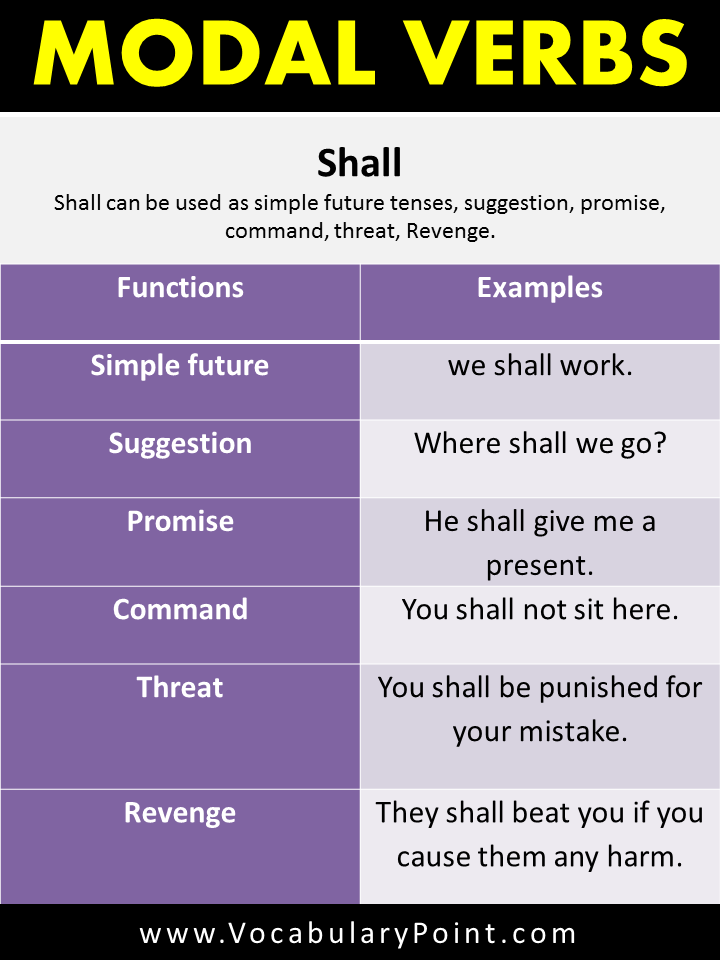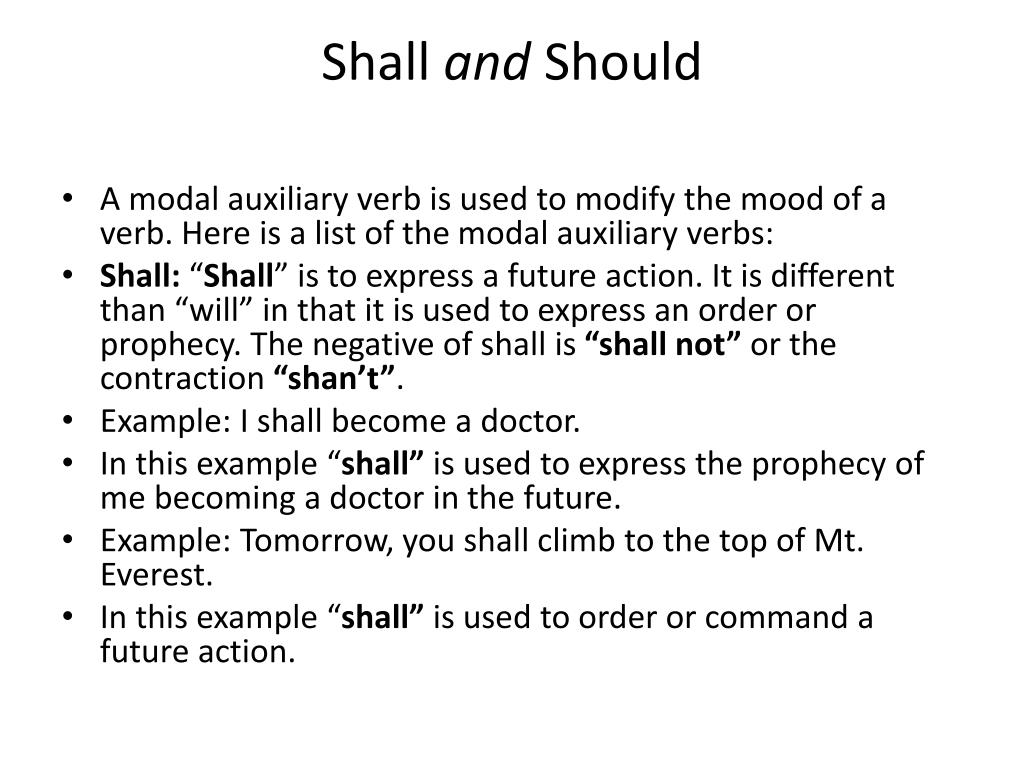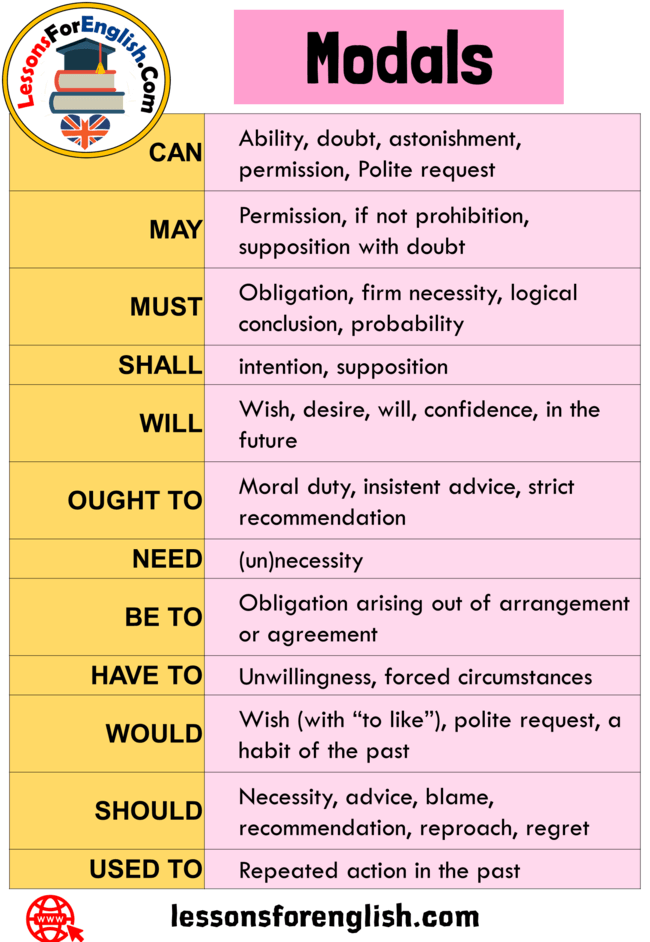
Shall vs Should Difference and Comparison
What are modal verbs?Modal verbs are auxiliary verbs, A.K.A. helping verbs. They are words to show possibility, permission, ability, or obligation. There are.

Should English grammar, English vocabulary words, English verbs
The word 'shall' is used to show strong intention/assertion about an action that will happen in the future. 'Shall' is used more in formal writing than 'should'. The word 'should' is used to give suggestions/advice. It's also used when one is talking about probable situations. 'Should' is the past tense of 'shall'. Usage.

Modal verbs shall, should, ought to Mingleish
Type of use. I shall be in the office at 7:00 AM tomorrow. To express certainty about the future. Children under seven shall not enter the building alone. To express rules. Shall vs should is a debate as old as time. Once you learn the difference you will be a better communicator, advisor, and leader in English.

Modal Verbs in English Vocabulary Point
Snapshot of the Differences between "Shall" and "Should". "Shall" is primarily used to express an intention or promise. "Should" expresses a suggestion, advice, or recommendation. It is primarily used in the future tense. While it is used in the future tense, it also works for past obligations.

Shall Vs Should Modal Verbs with Examples PDF English words, Helping verbs, Verb
Understanding 'Should'. 'Should' is a modal verb used for various purposes such as giving advice, talking about obligations, and expressing what is probable or expected. Let's dive into each mode of its usage. 1. Advice. 'Should' is commonly used to suggest or recommend something. It's equivalent to saying "it's advisable".

English Grammar Tenses, English Verbs, Learn English Grammar, English Language Learning, English
Key Takeaways. "Shall be" and "should be" are both used to express obligation or necessity, but "shall be" is more formal and is used to indicate a requirement or a legal obligation. "Should be" is used to express a recommendation or an expectation and is less formal than "shall be". "Should be" is used to suggest a.

Разница между Should и Shall — Справочник English Formula Online
Both should and shall are auxiliary verbs. Auxiliary verbs are followed by the simple form of a main verb. For example, "He should go.". In this sentence, "go" is the main verb. The.

PPT Modal Auxiliary PowerPoint Presentation, free download ID2605953
Will and Would. 'Will' is often used for the future tense, and is used to talk about something you plan to do, usually decided at the time of speaking. It is used for talking about yourself and also others. It is more informal than 'shall'. In spoken English it usually becomes "ll'; 'will not' usually becomes 'won't'.

Difference Between Will and Shall infographic Basic vocabulary english, English words, Learn
Itulah dia penjelasan perbedaan will, would, shall, should, dan could dalam peraturan tata bahasa Inggris. Semoga dapat membantu Anda dalam mempelajari bahasa Inggris lebih lanjut. Dalam bahasa Inggris, terdapat banyak aturan tata bahasa yang harus diikuti agar dapat menggunakan bahasa tersebut secara baik dan benar.

Using MUST and SHOULD, Example Sentences English Grammar Here English language learning
Should we explain the differences between "shall" and "should"? We answer all the questions with this great guide on how both words are used, with examples.

Difference Between Shall And Should Writing Geeks
Should memiliki makna seharusnya, kata should sendiri merupakan bentuk lampau dari shall, namun cara penggunaan sedikit berbeda.Penggunaan Shall biasanya digunakan bersamaan dengan subjek We.Aturan penggunaan kata Shall memang hanya dipakai untuk We saja, bukan You, dan lainnya.. Pertama, kata should dapat digunakan untuk mengekspresikan suatu tugas atau sesuatu yang memiliki keharusan untuk.

Shall vs Should Difference between Shall and Should
We should (shall) ask your mother first. He will (shall) be there around 6 o'clock. What to Use Instead of "Shall" in American English. In order to avoid confusion with your American conversation partner, just use it in really formal contexts (e.g., legal documents, manuals, or polite requests).

English Learning Uses of Shall and Should Modal Verb Shall and Should YouTube
More Examples Of Should & Shall Used In Sentences. Understanding the proper use of should and shall in sentences is essential for effective communication. In this section, we will provide more examples of how should and shall are used in sentences. Examples Of Using Should In A Sentence. You should take your medicine as prescribed by the doctor.

Modals SHALL Grammar Chart, English Grammar Worksheets, Learn English Grammar, English Lessons
Perbedaan Shall dan Should pun terletak pada penggunaan dalam kalimat future. Shall bisa digunakan dalam kalimat future sedangkan Should tidak bisa dan hanya digunakan untuk menyatakan sebuah saran atau keharusan. Shall memiliki makna dan fungsi yang sama ketika digunakan untuk menyatakan suatu keharusan. Bedanya kata Shall digunakan dalam hal.

Have to must and should 156348Have to must should exercises online
Modal Verbs Shall and Should. ' Shall ' and ' should ' are both modal verbs in English that are used to express various degrees of obligation or necessity, as well as suggestions, advice, and expectations. ' Shall ' is often used to express a specific obligation or requirement, and ' should ' is typically used to express a recommendation.

"Shall" vs. "Should" in the English grammar LanGeek
One of the most common mistakes is using "shuld" instead of "shall". While "shuld" is a valid spelling in some dialects, it is not the correct spelling in standard English. "Shall" is the correct word to use when expressing a future obligation or making a suggestion. 2. Using "Shall" Instead Of "Should".